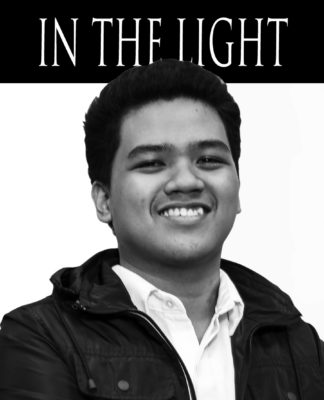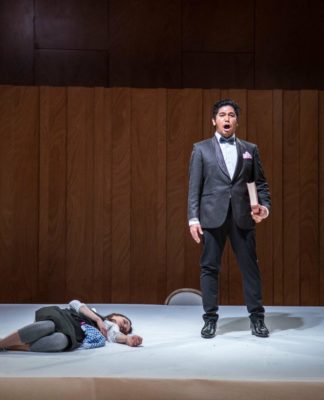UST OFFICIALS have reminded faculty members to respect Catholic teachings, citing the need to preserve the Catholic identity of the University.
Secretary General Fr. Winston Cabading, O.P., in a letter dated Aug. 23, requested Prof. Clarita Carillo, vice rector for academic affairs and research, to “issue a memorandum informing all faculty members of their obligations.”
“In light of recent events where some faculty members of Catholic Universities have publicly expressed dissenting positions from the Catholic bishops on matters of faith and morals, we, in the University, would like to reaffirm our fidelity to the magisterium of the Church as the Catholic University of the Philippines,” said the letter, a copy which was obtained by the Varsitarian.
The letter, which was disseminated by Carillo, said faculty members should “refrain from teaching or expressing personal opinions within the bounds of the University, anything contrary to Catholic faith and morals…in order to safeguard the right of the students to a solid Catholic Education.”
Cabading said in an e-mail to the Varsitarian the release of the memo was a “pro-active move on the part of the Institute of Religion and the Office of the Vice Rector for Religious Affairs.” Cabading wrote the memorandum before stepping down as head of the latter office.
Faculty members are also “obliged to uphold and show deference to their teaching authority” when bishops take a stand on an issue in behalf of the Church.
“The purpose of this premise is to see to it that all members of the Thomasian academic community resonate with one voice in giving the students a solid Catholic education,” Cabading said in his e-mail.
He added that the memo “did not dwell on whether certain acts are offensive or not” as “what is stated in the memo is already a policy.”
The policy also reminded all faculty members that “any statements or actions by faculty members [found] offensive to Catholic ideals and teachings may be a cause for dismissal after due process.”
“The memo was simply a reiteration of what is already explicitly stipulated in the 2011 General Statutes of the University, i.e. Articles 1, 39 par. 2 and 40 par. 3,” he said.
Cabading also said non-Catholic faculty members are also bound by the obligation to give students a solid Catholic education.
“Non-Catholic faculty members become accepted into the University to teach because we recognize their competence in imparting knowledge in their field. However, when they applied they already knew beforehand that they were applying in a Catholic institution,” he said, citing General Statutes 2011, Art. 39, par. 2, which “binds them to show respect to Catholic ideals in their research and teaching.”
Jeers, cheers
For Faculty of Arts and Letters Philosophy professor Robert Montaña, the memo was a “preventive” measure against the positions taken by professors of other Catholic universities on the reproductive health bill.
“We (UST) have a lot to protect since Catholicism is concerned. This is not an overreaction since we are a royal and pontifical institution,” Montaña said.
But he said some parts of the memorandum should be clarified particularly the “statements and actions offensive to Catholic ideals.”
Likewise, Paolo Bolaños, chair of the Department of Philosophy, said it was “just normal” for the University to react that way.
“[The memorandum] is a blanket message to the faculty, reminding them that they should be careful and prudent enough [with what they say],” he said.
“A university, Catholic or otherwise has the prerogative [of determining] whether the faculty is qualified to teach and has the moral [tendency] for their institution,” Bolaños added.
However, the letter’s mention of dismissal as a sanction may appear as threat to the faculty, some of whom may not be aware of the contents of Catholic texts or Catholic documents. What is “offensive to Catholic ideals” is also not clear, he said.
A professor who asked not to be named said the issue behind the policy is the “power of the faculty members to express [their] ideas.”
“It violates the academic freedom among faculty members since they will be restrained from expressing themselves,” he said.
Montaña, however, said otherwise: “[M]ali ‘yung interpretation na ‘yan na iniipit ‘yung freedom ng faculty to express themselves. Professors have their responsibilities both to the institution and parents of their students that expect pedagogical bias in favor of Catholicism.” Bernadette D. Nicolas and Cez Mariela Teresa G. Verzosa


















As faculty and graduates of a Catholic University, we have the rare privilege of being missionaries of our Catholic faith. We are called to reaffirm Church’s teachings in our daily lives. With God’s grace we continue to promote and practice the values we treasure.
What has your institution to lose when positions different from that of your church are expressed or offered? If you believe so much in the competence of your faculty or in the soundness of what your church supposedly teaches, you would not make so big a deal of having to “defend” your ideals through administrative sanctions like dismissal because the soundness of your teaching should suffice to uphold itself.
Thomasian inquisition at its best. Just like the Spanish inquisition.